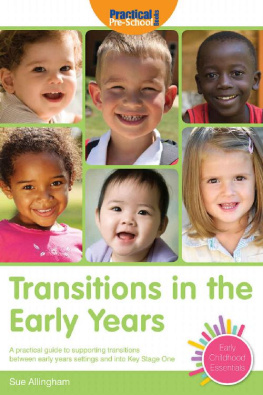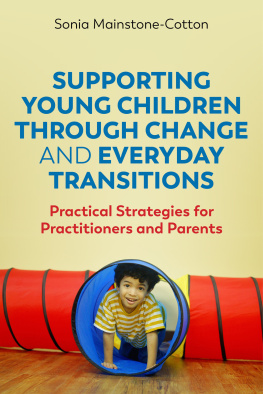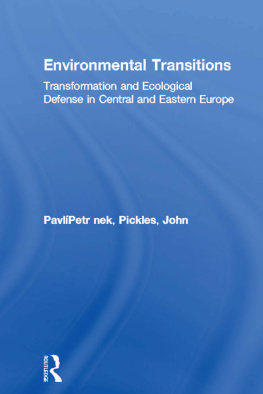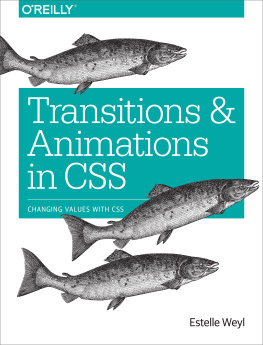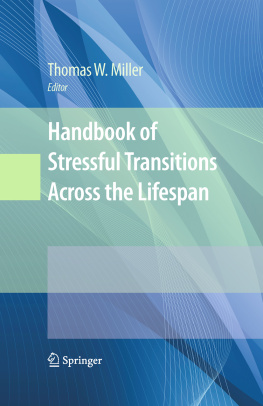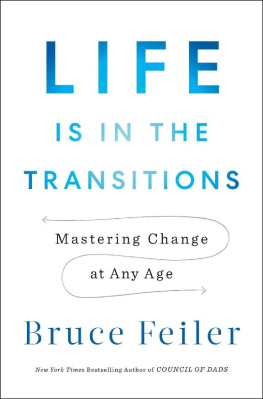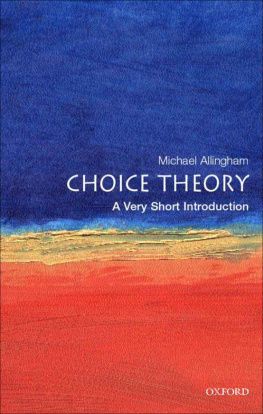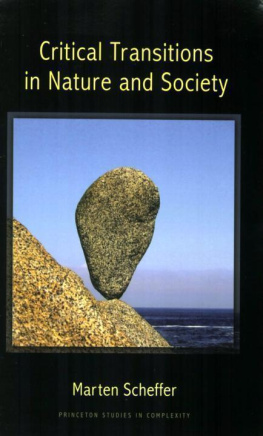Sue Allingham - Transitions in the Early Years
Here you can read online Sue Allingham - Transitions in the Early Years full text of the book (entire story) in english for free. Download pdf and epub, get meaning, cover and reviews about this ebook. year: 0, genre: Science / Children. Description of the work, (preface) as well as reviews are available. Best literature library LitArk.com created for fans of good reading and offers a wide selection of genres:
Romance novel
Science fiction
Adventure
Detective
Science
History
Home and family
Prose
Art
Politics
Computer
Non-fiction
Religion
Business
Children
Humor
Choose a favorite category and find really read worthwhile books. Enjoy immersion in the world of imagination, feel the emotions of the characters or learn something new for yourself, make an fascinating discovery.
- Book:Transitions in the Early Years
- Author:
- Genre:
- Year:0
- Rating:4 / 5
- Favourites:Add to favourites
- Your mark:
- 80
- 1
- 2
- 3
- 4
- 5
Transitions in the Early Years: summary, description and annotation
We offer to read an annotation, description, summary or preface (depends on what the author of the book "Transitions in the Early Years" wrote himself). If you haven't found the necessary information about the book — write in the comments, we will try to find it.
Transitions in the Early Years — read online for free the complete book (whole text) full work
Below is the text of the book, divided by pages. System saving the place of the last page read, allows you to conveniently read the book "Transitions in the Early Years" online for free, without having to search again every time where you left off. Put a bookmark, and you can go to the page where you finished reading at any time.
Font size:
Interval:
Bookmark:
Title page
Transitions in the Early Years
A practical guide to supporting transitions between early years settings and into Key Stage One
by Sue Allingham
Copyright page
Originally published by Practical Pre-School Books, A Division of MA Education Ltd, St Judes Church, Dulwich Road, Herne Hill, London, SE24 0PB.
Tel: 020 7738 5454
www.practicalpreschoolbooks.com
MA Education Ltd 2011
2012 digital version by Andrews UK Limited
www.andrewsuk.com
All images MA Education Ltd., other than the images listed below.
Front cover images (clockwise from top left): iStockphoto.com/microgen, iStockphoto.com/Steve Debenport, iStockphoto.com/Claudia Dewald, iStockphoto.com/Rosemarie Gearhart, iStockphoto.com/Brittney McChristy, iStockphoto.com/Miroslav Ferkuniak.
All photos other than the above taken by Ben Suri.
All rights reserved. No part of this publication may be reproduced, stored in a retrieval system, or transmitted by any means, electronic, mechanical, photocopied or otherwise, without the prior permission of the publisher.
Understanding transitions

Supporting and understanding transitions

Everyone feels comfortable
This book is for everybody who works with children. Early transitions affect not just those working in the early years from birth to five but also those working beyond that and into primary school. A list of the adults involved in transitions in the early years must include:
- Teachers (see the broad definition in the glossary at the end of this chapter)
- Administration staff
- Visiting adults, such as photographers, and specialists who teach music, dance, French etc.
- Adults from other agencies. For example, health visitors, school nurses, early years advisory teams, speech therapists, and physiotherapists
- Assessors visiting adults who are training in early years work
- Students
- Kitchen staff
- Parent helpers and volunteers
Defining a transition: key messages
The key messages in this book are aimed at supporting children and adults to cope with transitions both between and within settings these practical ideas will be valuable to all who work with children and families in whatever capacity or setting, and at whatever stage of development.
In this book I define transition as any kind of change that may alter the routines that the children, and sometimes the adults, are used to. This does not just mean moving from room to room or between settings. The change can also be something as simple as the introduction of a new staff member, a staff member leaving, an unexpected visitor to the group, or someone different bringing the child to, or collecting them from, the setting.
These key messages are not dependent upon a particular curriculum or national education system as, wherever you are based, there is a need to have an understanding of how children, and adults, can be supported in coping with the potential issues around transition. This is particularly important to be aware of at a time when policies and guidance are under review. The messages in this book have their roots in respected research and good practice.
Different curricula
Being aware of, and managing appropriately, the effect that transition events may have on the feelings of the children in our settings is central to supporting them. It is important to note that, whatever curriculum you are working from, the documents that you have will be in agreement with, and support, the thinking that this book will encourage. This is because each curriculum document recognises the need for consistency across each stage of learning. The section below illustrates the focus that each of the early years curricula from the four governments in the United Kingdom places on transitions.
Key supporting points from The Early Years Foundation Stage
This document is an amalgam of previous documents with the purpose of promoting continuity from birth to five and supporting childrens learning and development and welfare (DCSF, 2008, page 5). The EYFS clearly identifies that children will be educated in a variety of settings:
Many children will receive education and care under the EYFS framework in more than one setting. Some may attend part-time, while others may attend full-time and also use extended services, such as breakfast or after-school clubs. These patterns of attendance will be a key factor in planning. For children who attend more than one setting, practitioners must ensure effective continuity and progression by sharing relevant information with each other and parents. (EYFS (2008) Statutory Framework for the Early Years Foundation Stage , DCSF, page 6)
The suggestions made here, such as continuity and sharing information with parents, will be discussed in subsequent chapters in this book.
Key supporting points from the Welsh curriculum
The Welsh Government revised their national curriculum to develop more consistency between the different phases of early education:
The Foundation Phase is based on the principle that early years provision should offer a sound foundation for future learning through a developmentally appropriate curriculum. It will bring more consistency and continuity to childrens education at such an all-important period in their development. (http://wales.gov.uk/topics/educationandskills/earlyyearshome/foundation_phase/?lang=en)
The Welsh Foundation Phase runs from the ages of three to seven. In this way the stage incorporates what teachers in England would see as Key Stage One, and thus a more formal curriculum. The underpinning ethos is that:
Practitioners should acknowledge prior learning and attainment, offer choices, challenge children with care and sensitivity, encourage them and move their learning along. Through careful observation and interaction with children, practitioners should focus on their achievements and development along a learning continuum. Observation is an integral part of the planning process. Future planning is based on their prior attainment and current achievements.
Observation and assessment enables practitioners to:
- know the individual child and highlight the childs strengths, interests and needs to identify the plan for the childs progress
- highlight the childs strengths and abilities across all areas of development and intelligences
- provide a graduated response and specific help to children whose progress is not adequate and who may be on the continuum of special educational needs (Welsh Assembly Government, Special Educational Needs Code of Practice for Wales, 2004)
- inform children, staff, parents/carers of childrens achievements and the next steps in their learning
- identify, monitor and evaluate the effectiveness of the curriculum provided
- inform transition/transfer during the Foundation Phase, as well as between the Foundation Phase and Key Stage 2 (Welsh Assembly Government (2009) Foundation Phase Child Development Profile Guidance, Department for Children, Education, Lifelong Learning and Skills, page 2).
Key supporting points from the Scottish curriculum
The Scottish Curriculum for Excellence includes a guidance document called Pre-school into Primary Transitions which states that It has always been recognised that the transition from pre-school to primary school is a critical time of change for children, parents and practitioners which is full of opportunity and potential (Learning and Teaching Scotland, 2010, page 5). There is recognition that, [t]he impact of transitions in the early years can strongly influence a childs future progress and development (Learning and Teaching Scotland, 2010, page 6).
Next pageFont size:
Interval:
Bookmark:
Similar books «Transitions in the Early Years»
Look at similar books to Transitions in the Early Years. We have selected literature similar in name and meaning in the hope of providing readers with more options to find new, interesting, not yet read works.
Discussion, reviews of the book Transitions in the Early Years and just readers' own opinions. Leave your comments, write what you think about the work, its meaning or the main characters. Specify what exactly you liked and what you didn't like, and why you think so.

